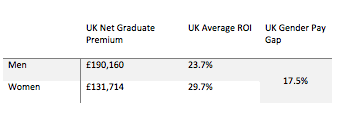In Spite of Gender Pay Gap, Women Earn Greater Return on Investment in Higher Education

The U.K. is Europe’s most popular destination for international students, and the second in the world after the U.S. The strong reputation of British universities guarantees a competitive advantage to those who gain a U.K. degree.
It is not cheap to do so, though. Course fees in the U.K. vary, but the average Ph.D. costs students from within the European Union (E.U.) between £3,000 (roughly $4,200) and £6,000 (roughly $8,400) per year. However, for non-E.U. students, fees can be considerably higher.
Which Degree Guarantees the Best Return on Investment
Not all degrees are created equal. Some of them might lead to good entry-level salaries and others might guarantee the best return on investment, but the truth is that education confers significant wage advantages to individuals.
Unfortunately, in the developed world, a gender pay gap is still present and affects the job market. Research by the OECD has shown that the U.K. and U.S. have considerable disparities between what women and men earn. In the U.K., men earn 17.5 percent more than women, and in the U.S., the pay gap is 17.9 percent. This finding may not be quite as transparent as once thought.

Surprisingly, for British women there is a positive news.
Activia Training, a U.K.-based provider of corporate training, has conducted a new study to examine the differences in graduate earning returns relative to degree subject. The data highlights the differences in ROI between men and women in the main subjects of study in higher education.
In spite of the stark gap in salaries paid to men versus women, the marginal earnings return for women is in fact higher than that for men. On average, women who enroll in higher education courses experience a much better return on investment than their male counterparts. The return on investment for women is in fact 6 percent higher.
Nevertheless, the net graduate premium for men is higher than for women. This is according to data compiled from the U.K. Department for Business Innovation & Skills.
The “net graduate premium” represents the present value of the benefits associated with an undergraduate degree relative to an individual in possession of two or more GCE ‘A’ Levels (gross graduate premium) minus the present value of the costs associated with acquiring a degree.
Here, there is still a big difference between men and women. On average, the net graduate premium for men in the U.K. is around £60,000 (roughly $84,000) higher than that for women. The pay gap is 17.5 percent, but women earn greater return on investment in higher education.
How Is It Possible?
Gavan Colon from London Economics explains why the net graduate premium is higher for men than women: “Women not in possession of higher education degrees are more likely to achieve lower earnings than men. This is the main reason why the earnings premium is higher than for men in percentage terms, but the financial or monetary benefit is lower in absolute terms.”
Furthermore, the study examines the cost of education, considering the average fee for a high-level degree plus a fee to attend an undergraduate course, in comparison with the average entry-level salary in a given sector.

Banking and finance jobs give the highest salaries, but graduates from medicine and dentistry master’s courses, as well as graduates from law schools, have higher returns. Those studying design and creative arts have the lowest returns (sometimes even below the national average), but their investment in education is much lower.
Steve Warren from Activia Training says, “Women in creative fields, such as design, journalism, and linguistics, get a lot more out of their education than their male counterparts. Even in fields like medicine and business, the data shows an unmistakably higher return on investment for women. This should give business leaders food for thought when tackling the issue of gender pay inequality.”
In conclusion, despite the economic downturn, as a result of the enhanced earnings and employment outcomes compared to the next best alternative, a U.K. degree remains an exceptionally good investment for both men and women. Hopefully, in the foreseeable future the gender pay gap will not affect the society, the culture, and the job market.

